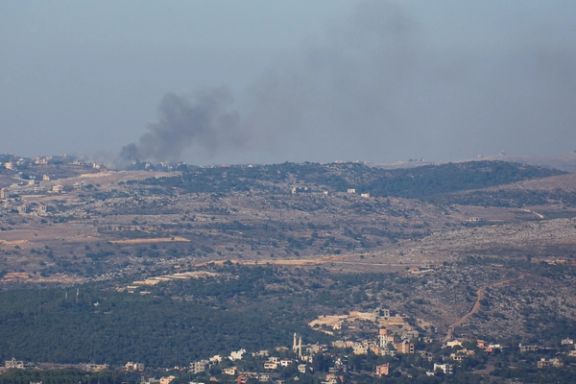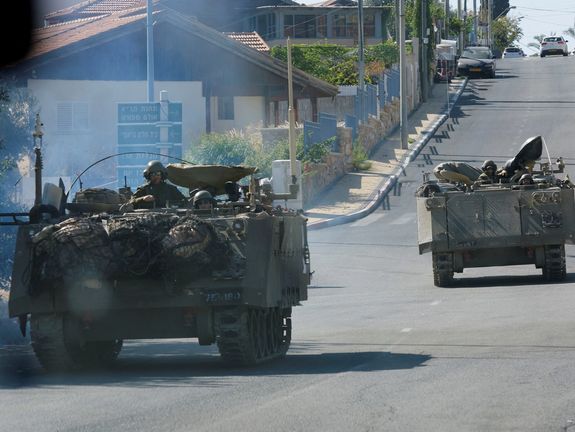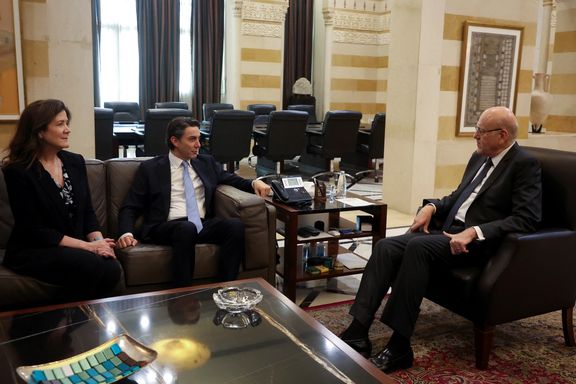Israel-Hezbollah Fire Flaring Up At Lebanon Border

Since the leader of Iran-backed Hezbollah talked of multiple fronts of Middle East conflict, ignited by Hamas' October 7 attack on Israel, tensions are growing fast between Israel and Lebanon.
Hezbollah has been exchanging fire with Israeli forces across the border since October 7, when Hamas -- another Iran-funded militia – declared war on Israel in a multi-thronged terror attack codenamed al-Aqsa Flood (Storm in Persian) and killed over 1,400 mostly civilians and took at least 241 more hostages into the Gaza Strip. Since Friday, when Hassan Nasrallah broke his month-long silence on its Palestinian ally’s war with Israel, the conflict has become deadlier with more frequent bouts of fire.
On Saturday, Israeli warplanes conducted airstrikes along the border with Lebanon as the militant Hezbollah group attacked several Israeli army posts, including one that was struck with two large rockets. On Sunday, an Israeli civilian was killed when an anti-tank missile from Lebanon hit a vehicle near Kibbutz Yiftah in the Upper Galilee. Also on Sunday, a barrage of rockets launched from Lebanon landed in Kiryat Shmona, causing damage. Kiryat Shmona has been evacuated, along with dozens of other communities along the Lebanon border, due to repeated Hezbollah rocket and missile attacks. Earlier in the day, an Israeli airstrike reportedly killed four civilians in southern Lebanon.
On Monday night, Hamas militants in southern Lebanon fired some 30 rockets at Israel, triggering air-raid sirens in cities including Haifa, Nahariya and Acre. Several of the rockets were intercepted, while most fell in the Mediterranean Sea. Hamas claimed responsibility for the attacks, saying it “struck the occupied city of Nahariya and southern Haifa in northern occupied Palestine [Israel] with 16 missiles.”
The Israeli army on Tuesday said it hit two targets inside the Lebanese territory, including a military post of the Hezbollah group. An IDF tank targeted a terror cell preparing to launch an anti-tank missile towards Moshav Shtula. A “suspicious aerial target” was also prevented from entering Israel from Lebanon on Tuesday afternoon. The death toll of the Hezbollah fighters killed by the Israeli forces since October 8 has risen to 63, according to a statement by the group.

Although Nasrallah denied any involvement in the Hamas October 7 attack, he thanked all other Iranian proxy forces across the region for joining hands at the war against Israel. The al-Aqsa Flood battle has extended to more than one front, he said, adding, “We thank the Iraqi, Yemeni hands that joined this battle."
Iran's Revolutionary Guards founded Hezbollah in 1982, in the middle of Lebanon's 1975-90 civil war. It was part of Iran's effort to export its 1979 Islamic Revolution around the region and fight Israeli forces after their 1982 invasion of Lebanon.
Alongside continued calls for action against Israel from the top echelons of Iran's regime, Hezbollah has been escalating day by day, forcing Israel to keep its forces near the Lebanese border instead of the Gaza Strip and the West Bank. Nasrallah said in the televised address. "What's happening on the border might seem modest but is very important."
Iran and Hezbollah have been accused of full involvement in the planning of the October attack, with several public and secret joint meetings having been held since April in Beirut and Damascus. Interrogation of Hamas militants has revealed even the timing of the attack was coordinated with Tehran. Iran, along with Hezbollah has repeatedly threatened that the war will escalate to other fronts unless Israel halts its retaliatory offensive against Hamas in Gaza.
Lebanese pundit Bechara Khairallah told Iran International there is a kind of chaos in Hezbollah's leadership, especially because Nasrallah had promised to connect the battlefields but did not act on that promise. He underlined that Nasrallah’s halfhearted involvement in the war sparked by the October 7 attack showed that Hezbollah's primary allegiance is to the Islamic Republic, and Tehran's interests take precedence over the interests of Arab countries and the so-called Palestinian cause.
He also stressed that Hezbollah would not expand the conflicts in southern Lebanon since it is concerned about the severity of Israel's reaction. Despite the Lebanese people showing solidarity with Gazans, no one advocates for entering a war, and no political figure encourages Nasrallah to expand the war in Gaza, Khairallah noted.
Last week, Samir Geagea, the leader of Lebanon's biggest Christian party, the Lebanese Forces, called on Hezbollah to withdraw its forces from the south of the country, stating that “dragging us into the war would be a crime," the country already economically on its knees.

As the conflict between Israel and Hamas reverberates across the Middle East, the risk of war between Hezbollah and Israel remains higher than at any point since their last big conflict in 2006. In addition to sporadic clashes in the West Bank and multiple rocket and drone attacks against bases hosting US forces in Iraq and Syria, Hezbollah’s active engagement in the war can significantly change the landscape of the conflict.
However, Hezbollah has not yet unleashed its large missile arsenal against Israel or tried any incursions. According to the latest public estimates, Hezbollah has around 150,000 rockets and missiles, most with a reported range of a few dozen to hundreds of kilometers. On Thursday, The Wall Street Journal reported that Russia's Wagner mercenary group plans to provide Hezbollah with an air defense system, foreshadowing planning for a looming war.